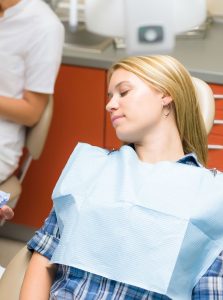I’m a nervous patient. I need a root canal treatment and don’t think I can get through it on my own. I want to try dental sedation but am worried the sedation itself could be a problem. I do get nauseated easily. I’ve heard with sedation, you get super sleepy. What if I sleep through getting sick? Have you heard of patients asphyxiating in their sleep from sedation?
Pam
Dear Pam,
I love that you are seeking ways to get treatment instead of avoiding it. That shows a lot of wisdom and courage on your part. When patients allow their fear to keep them from getting the care they need, it almost always leads to a dental emergency with more invasive procedures and a greater financial hit.
Because you’re being proactive, you can avoid all of that.
There are three types of dental sedation. Most dentists offer the first two.
Sedation Level One: Nitrous Oxide
Dubbed laughing gas, this is the mildest form of sedation. It’s most useful for patients with mild dental anxiety. Your dentist will provide a nosepiece you simply wear during the procedure to breathe in the gas. You’ll feel relaxed and a bit floaty. This calms your anxiety and allows the numbing medication to work more effectively.
Once your root canal treatment is done, the dentist will switch the gas from nitrous to oxygen and in a short period of time, you’ll feel right back to normal and are able to go on with your day however you want.
It is rare for someone to experience nausea using this method. Studies have shown instances of nausea slightly increase for every hour after the first hour using the gas. Though, even then, it is still rare.
Sedation Level Two: Oral Conscious Sedation
This is best for patients with a strong anxiety level. You will take a pill before your appointment which completely relaxes you. It’s so strong, you will need someone to drive you to and from your appointment, as well as stay with you at your home until you are lucid and steady on your feet again. Though you’re conscious, many people call this sleep dentistry because most patients simply sleep through their entire procedure.
Because this is stronger, there is a slightly increased risk of nausea. Because of that, a dentist will ask you not to eat before the appointment to minimize any risk. If you have trouble skipping meals, simply schedule your appointment for first thing in the morning. As soon as you feel yourself, you can eat again.
I know you’re concerned about asphyxiation, but that is highly unlikely. You are conscious so if you happened to be among the rare number of patients who do get sick, you’ll be able to let your dentist know and they can help.
Because you’re prone to nausea, it would be helpful for you to alert your dentist to this. They can then provide you with Zofran, which is an anti-nausea drug. That should eliminate any significant risk for you. If you ever have to have surgery, make sure you tell your anesthesiologist as well, they can mix Zofran with your anesthesia.
Sedation Level Three: IV Sedation
Not as many dentists offer this, but it is available at some practices. This is for patients who want to be completely out. You will need someone with you as a caregiver after this procedure as well.
Talk to your dentist. Let him or her know your concerns. They’ll help you pick the type of sedation which is most useful to you.
This blog is brought to you by Baton Rouge Dentist Dr. Steven Collins.
